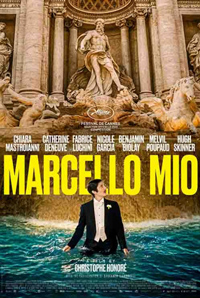In the Name of the Father: Honore Pays Homage via Identity Crisis
 “I only exist when I am working on a film,” Marcello Mastroianni once said, who is, of course, resurrected through the prism of his daughter Chiara Mastorianni in Marcello Mio, the latest feature from Christophe Honoré. Having passed away in 1996, well before the daughter he had with Catherine Deneuve found her own success as an actor, (thanks in part to being a muse for Honoré during the early part of his career in the 2000s), this approach provides a novel experience for the whole family to be together, in a sense. Honoré has long shown an interest in forging a path similar to Jacques Demy and his magical musicals which featured Deneuve (and her sister, Francoise Dorleac), and this latest is in the same self-aware company as his titles Les Chanson D’Amour (2007) and Beloved (2011), the latter which also featured Deneuve and Mastroianni.
“I only exist when I am working on a film,” Marcello Mastroianni once said, who is, of course, resurrected through the prism of his daughter Chiara Mastorianni in Marcello Mio, the latest feature from Christophe Honoré. Having passed away in 1996, well before the daughter he had with Catherine Deneuve found her own success as an actor, (thanks in part to being a muse for Honoré during the early part of his career in the 2000s), this approach provides a novel experience for the whole family to be together, in a sense. Honoré has long shown an interest in forging a path similar to Jacques Demy and his magical musicals which featured Deneuve (and her sister, Francoise Dorleac), and this latest is in the same self-aware company as his titles Les Chanson D’Amour (2007) and Beloved (2011), the latter which also featured Deneuve and Mastroianni.
Chiara Mastroianni has clearly enjoyed success as an actor, but finds herself constantly contrasted, usually in negative terms, with one or both of her parents. A somewhat disastrous tribute to her father, being filmed by an irate Spanish director finds Chiara dressed as Anita Ekberg in La Dolce Vita (1960), sputtering about in the Trevi Fountain. One night, she sees the face of her father transposed atop her own in the mirror, and she collapses in fright. Her mother Catherine confirms she’s only seeing things, prepping Chiara to audition for a new project being directed by Nicole Garcia (who promptly asserts she’d like Chiara to be more Mastroianni, less Deneuve). The project’s co-star, Fabrice Luchini (who acted alongside Deneuve in 2010’s Potiche) takes a liking to her, and asks her to call him anytime should she need someone to talk to about the specific plights an actor faces. While rehearsing in anticipation for a performance at her friend Benjamin Biolay’s upcoming concert, Chiara decides to dress as her father and adopt his persona, asking everyone to call her Marcello. However, those in her intimate circle find this alarming.
In comparison to other recent second generation French directors paying homage to their parents, such as Lisa Azuelos with I Love America (2022) and Mona Achache in Little Girl Blue (2023), Honoré gives Mastroianni something a bit more playful but arguably more slight to roam around in. Actual moments of bittersweet contemplation are few and far between, the most poignant arriving courtesy of Deneuve, talking about how their cinematic images may remain, but eventually, no one will remember anything about the real people playing their roles. A handful of supporting actors and directors also playing versions of themselves initially add some interesting elements of metafiction, such as Melvil Poupaud, who was a youthful romance for Mastroianni, apparently charged with ‘looking after’ Chiara by her late father. Less successful is Fabrice Luchini who seems to sprout an immediate affinity for Chiara, his allegiance taking on a grating, schmaltzy dimension.
What’s most interesting is how Marcello Mio attempts to navigate what it might feel like for the progeny of such notable cinematic luminaries, especially for one who favors her father. One gets the sense Chiara Mastroianni prefers the Italian side of her heritage as more welcoming and receptive than the French based on several observations made. Honoré has always reveled in presenting fluid sexualities with his characterizations, from Seventeen Times Cecile Cassard (2002) to Les Chansons D’amour (2007) where men and women who initially identify as one sexual orientation led to participate in emotional and physical relations with someone outside their professed realm of interest. A gay British soldier named Colin (Hugh Skinner) who’s pining away for a French lover a la An Affair to Remember (1957), ends up fulfilling this energy, the only completely fictional character amongst the principals.
Mastroianni is the film’s exceptional highlight, who approaches portraying her father in drag with a certain mournful reverence, strongly resembling a slender, dandy version of her father. In one of Honoré’s more over the top moments, Chiara absconds to Rome to appear on a television show to surprise Stefania Sandrelli, who appeared opposite Marcello in the 1961 classic Divorce Italian Style. But Marcello Mio’s best moments are encapsulated with the complicated energies shared by mother and daughter, perhaps best when they decide to visit their old family home (reminiscent of Jane Birkin and Charlotte Gainsbourg visiting Serge Gainsbourg’s preserved home in Jane by Charlotte, 2021). But somewhere along the way, Honore gets caught up in the sweep of deference, and Marcello Mio feels as if it’s not quite sure how to rightfully conclude. For fans of the key players, some of these elements might be much easier to overlook, but it’s a decidedly affectionate homage to the daughter of two acting legends, eclipsed by both, but from their shadows creating her own unique narrative.
Reviewed on May 21st at the 2024 Cannes Film Festival – Competition. 120 Mins.
★★★/☆☆☆☆☆


